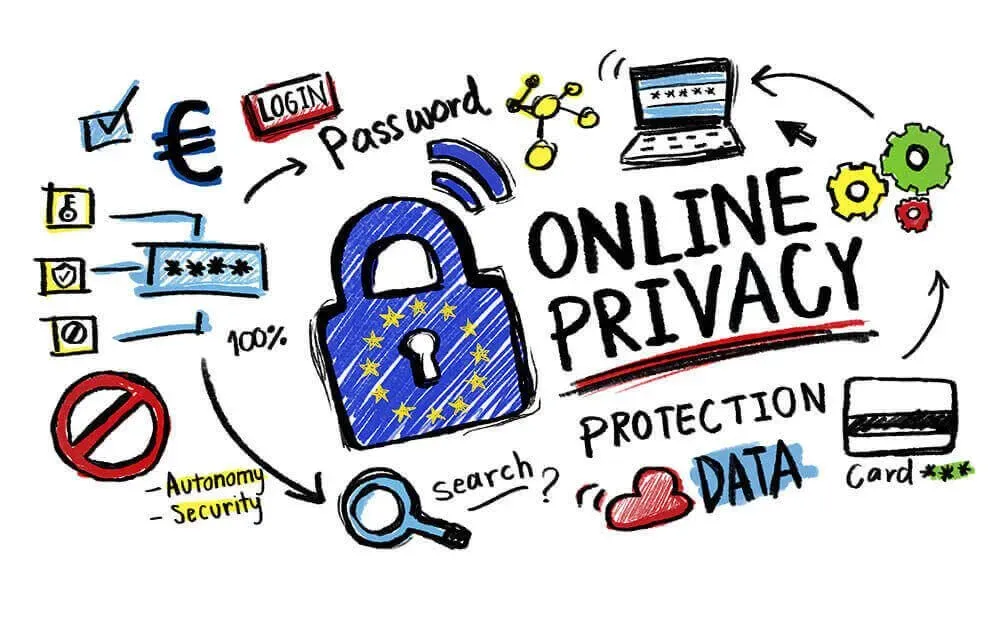In today’s digital age, it’s more important than ever to protect your privacy online. With the increasing reliance on technology, including artificial intelligence, safeguarding your personal information security has become a critical concern. Many individuals are turning to strategies like browsing in incognito mode or utilizing a temporary email to enhance their online privacy. These methods not only provide a layer of anonymity but also help mitigate risks associated with data breaches and unwanted tracking. By following essential online privacy tips, you can take control of your digital footprint and ensure that your sensitive information remains secure.
As we navigate the vast landscape of the internet, understanding how to maintain confidentiality becomes paramount. Whether through discreet browsing practices or temporary communication methods, there are numerous techniques available to enhance your online anonymity. The rise of sophisticated technologies, particularly artificial intelligence, has made it essential to be proactive about protecting personal data. Implementing various strategies can empower users to secure their digital presence and enhance their overall online experience. By adopting these practices, you can significantly reduce the risks associated with sharing personal information in a hyper-connected world.
Understanding Incognito Mode for Enhanced Privacy
Incognito mode, also known as private browsing, is a popular feature offered by most web browsers. It allows users to surf the internet without saving browsing history, cookies, or site data. When using incognito mode, your browsing sessions are not stored on your device, providing a layer of privacy that can be particularly beneficial when accessing shared or public computers. However, it’s important to remember that while incognito mode hides your activity from other users of your device, it does not make you completely anonymous online.
When leveraging incognito mode, you can enjoy a more secure online experience while exploring various websites. This feature is especially useful for researching sensitive topics or when you want to avoid targeted ads based on your previous searches. Nevertheless, users should complement incognito browsing with additional online privacy tips, such as using a Virtual Private Network (VPN) to further obscure their internet activity.
Using Temporary Email Services for Privacy Protection
Temporary email services offer a practical solution for individuals looking to safeguard their personal information online. By creating a disposable email address, users can sign up for websites or services without exposing their primary email. This method prevents spam and unsolicited emails from cluttering your inbox, while also providing an extra layer of anonymity. Temporary emails are especially useful in situations where you’re unsure about a site’s credibility.
In addition to reducing spam, using a temporary email can help protect your privacy when engaging with online platforms. Since many services require an email address for account verification, opting for a temporary solution allows you to maintain your privacy without sacrificing access. It’s a simple yet effective strategy to minimize the risk of your personal information being compromised.
Artificial Intelligence and Personal Information Security
As artificial intelligence continues to evolve, so do the concerns surrounding personal information security. AI systems often collect vast amounts of data to function effectively, which can raise red flags regarding privacy. Users must be aware of how their data is being used and stored, especially when interacting with AI-driven applications. Understanding the terms of service and privacy policies can help individuals make informed choices about their data.
To enhance personal information security, users should adopt practices that limit data sharing with AI applications. This includes reviewing app permissions, opting out of data collection wherever possible, and utilizing privacy tools that assist in managing what information is shared. By taking these proactive steps, individuals can enjoy the benefits of artificial intelligence while minimizing potential risks to their privacy.
Top Online Privacy Tips to Safeguard Your Data
In today’s digital landscape, protecting your online privacy is more crucial than ever. Here are some essential online privacy tips to help you safeguard your data: First, always use strong and unique passwords for your accounts, and consider employing a password manager to keep track of them securely. Additionally, enable two-factor authentication wherever possible to add an extra layer of protection against unauthorized access.
Another effective tip is to regularly review your privacy settings on social media and other online platforms. Limit the amount of personal information you share publicly and be cautious about friend requests or connections from unknown individuals. Finally, consider using secure browsers and privacy-focused search engines to further enhance your online security.
The Importance of Protecting Your Privacy Online
Protecting your privacy online should be a top priority in an age where data breaches and cyber threats are rampant. When you take steps to safeguard your personal information, you not only protect yourself from identity theft but also maintain control over how your data is used by companies and third parties. Understanding the importance of privacy can empower individuals to be more vigilant and proactive in managing their online security.
Moreover, safeguarding your privacy fosters a sense of trust in the digital ecosystem. As individuals become more aware of the risks associated with sharing personal data, they are likely to demand better privacy practices from companies. This shift can lead to a more secure online environment where users feel comfortable interacting without the fear of their information being misused.
Navigating Online Risks with Artificial Intelligence Tools
While artificial intelligence offers numerous benefits, it also presents unique challenges regarding online privacy. AI tools can analyze vast amounts of data, often leading to concerns about how this information is utilized. Users need to navigate these risks carefully, ensuring they understand the implications of using AI technologies in their daily lives.
To mitigate these risks, individuals should stay informed about the latest developments in AI and data privacy. This knowledge enables users to make educated decisions about which AI tools to adopt while prioritizing their personal information security. Additionally, engaging in discussions about ethical AI use can help shape a future where technology respects individual privacy.
Leveraging Technology for Enhanced Privacy Controls
Modern technology provides various tools and features designed to enhance online privacy. From browser extensions that block trackers to applications that encrypt your communications, leveraging these technologies can significantly improve your personal information security. By incorporating these tools into your daily internet use, you can create a more protected online environment.
Furthermore, it’s essential to stay updated on new privacy technologies as they emerge. Many developers are actively creating innovative solutions to address growing privacy concerns. By adopting these advancements, users can take charge of their online presence, ensuring that they remain protected against potential threats.
The Role of Privacy Policies in Online Safety
Privacy policies play a crucial role in informing users about how their data will be handled by websites and services. Understanding these policies is vital for making informed decisions about whether to engage with a particular platform. Users should take the time to read privacy policies carefully before providing any personal information, as these documents outline the data collection, usage, and sharing practices of companies.
In many instances, a clear and transparent privacy policy can indicate a company’s commitment to protecting user data. If a policy seems vague or overly complex, it may be a red flag that the company does not prioritize privacy as it should. By staying vigilant and informed, users can better navigate the online landscape and choose platforms that respect their privacy.
Creating a Culture of Privacy Awareness
Fostering a culture of privacy awareness is essential for ensuring that individuals prioritize their online security. This involves educating not only oneself but also friends and family about the importance of protecting personal information. By sharing knowledge about privacy risks and best practices, a community can build a supportive environment that values data security.
Moreover, encouraging discussions around privacy can lead to greater collective action towards advocating for stronger privacy regulations. As more individuals become aware of the implications of data sharing, there will be a greater demand for companies to adopt privacy-conscious practices. Ultimately, creating a culture of privacy awareness can empower users and lead to a safer online experience for all.
Frequently Asked Questions
How does incognito mode help protect your privacy while browsing?
Incognito mode is a private browsing feature that prevents your browser from saving your activity history. While it doesn’t hide your IP address or encrypt your data, it helps protect your privacy by ensuring that your browsing sessions are not saved locally.
What is a temporary email and how can it help protect your privacy?
A temporary email is a disposable email address that allows you to receive messages without revealing your personal email. This can protect your privacy by minimizing spam and keeping your personal information secure when signing up for websites.
What role does artificial intelligence play in protecting your privacy?
Artificial intelligence can enhance personal information security by identifying threats and vulnerabilities in real-time. AI-powered tools can help detect unauthorized access and provide recommendations on how to protect your privacy online.
What are some online privacy tips to enhance personal information security?
To protect your privacy online, regularly update your passwords, use two-factor authentication, avoid sharing sensitive information on social media, and utilize tools like VPNs and incognito mode to enhance your online security.
Can artificial intelligence jeopardize personal information security?
While artificial intelligence can improve personal information security, it can also pose risks if not managed properly. Data breaches can occur if AI systems are compromised, so it’s crucial to implement robust security measures.
How can I effectively use incognito mode for better online privacy?
To effectively use incognito mode, remember to close the window after your session to ensure no data is saved. It’s also wise to combine this with other privacy measures, such as using a VPN, for enhanced protection.
What should I know about personal information security when using online services?
Personal information security is crucial when using online services. Always check privacy policies, limit the information you share, use strong passwords, and consider using temporary emails for less secure sites to protect your privacy.
How often should I practice online privacy tips to stay secure?
It’s important to practice online privacy tips regularly, as threats evolve constantly. Make it a habit to review your privacy settings, update passwords, and stay informed about the latest security measures to protect your privacy.
| Method | Description |
|---|---|
| Browsing in Incognito Mode | A private browsing mode that prevents your browser from saving your history or cookies. |
| Using Temporary Email | An email service that allows you to create a temporary email address to avoid spam and maintain privacy. |
| Utilizing AI Tools Wisely | Leveraging AI tools while being mindful of the information you share and the data they collect. |
Summary
To protect your privacy, it is essential to adopt strategies that minimize the exposure of your personal information. This includes leveraging tools like incognito browsing and temporary emails. By being proactive and informed about how your data is used online, you can significantly reduce the risk of privacy breaches and maintain greater control over your personal information.








